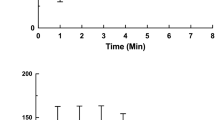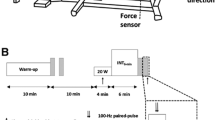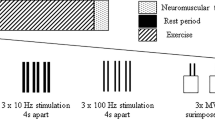Abstract
During constant-load exercise above the lactate threshold, oxygen-uptake kinetics deviate from the pattern seen below the threshold, with an additional, delayed component superimposed on the monoexponential pattern. It was hypothesised that this slow component is due to the progressive recruitment of type II muscle fibres. Oxygen uptake was measured for six male power athletes (group P) and six male endurance athletes (group E) during constant-load knee extension exercise tests in order to determine slow component amplitude. In addition, an electrical stimulation protocol was employed in order to assess the functional contractile profile and fatiguability of the knee extensors. The amplitude of the slow component during exercise was significantly (P<0.05) greater in group P than in group E when expressed as an absolute value [mean (SEM)=77 (17) ml min−1 and 24 (16) ml min−1] and when normalised to end-exercise oxygen uptake,V̇O2 [8.2 (0.5)% and 2.6 (1.8)%]. Group differences were observed for percentage force loss during the electrical stimulation protocol [50.0 (3.4)% and 31.5 (3.7)% for groups P and E, respectively], increase in relaxation time from start to end of the fatigue test [87.9 (15.5)% and 31.1 (11.9)%], and relaxation time for fresh muscle [32.4 (1.0) ms and 40.6 (2.1) ms]. These contractile parameters may indicate a higher proportion of type II fibres in group P compared with group E. These experiments have shown evidence of a relationship between the amplitude of the slow component and muscle contractile properties, indicating that the origin of the slow component may lie in the pattern of different muscle fibre types.



Similar content being viewed by others
References
Aaron EA, Johnson BD, Seow CK, Dempsey JA (1992) Oxygen cost of exercise hyperpnea: measurement. J Appl Physiol 72:1810–1817
Barstow TJ, Molé PA (1991) Linear and non-linear characteristics of oxygen uptake kinetics during heavy exercise. J Appl Physiol 71:2099–2106
Barstow TJ, Jones AM, Nguyen PH, Casaburi R (1996) Influence of muscle fibre type and pedal frequency on oxygen uptake kinetics of heavy exercise. J Appl Physiol 81:1642–1650
Beaver WL, Wasserman K, Whipp BJ (1973) On-line computer analysis and breath-by-breath graphical display of exercise function tests. J Appl Physiol 34:128–132
Beaver WL, Wasserman K, Whipp BJ (1986) A new method for detecting the anaerobic threshold by gas exchange. J Appl Physiol 60:2020–2027
Burke RE, Levine DN, Tsairis P, Zajac FE (1973) Physiological types and histochemical profiles in motor units of the cat gastrocnemius. J Physiol (Lond) 234:723–748
Cooper CB, Beaver WL, Cooper DM, Wasserman K (1992) Factors affecting the components of the alveolar CO2 output—O2 uptake relationship during incremental exercise in man. Exp Physiol 77:51–64
Coyle EF, Sidossis LS, Horowitz JF, Beltz JD (1992) Cycling efficiency is related to the percentage of type I muscle fibres. Med Sci Sports Exerc 24:782–788
Crow MT, Kushmerick MJ (1982) Chemical energetics of slow- and fast-twitch muscles of the mouse. J Gen Physiol 79:147–166
Fuglevand AJ, Macefield VG, Bigland-Ritchie B (1999) Force-frequency and fatigue properties of motor units in muscles that control digits of the human hand. J Neurophysiol 81:1718–1729
Gerrits HL, De Haan A, Hopman MTE, Van der Woude LHV, Jones DA, Sargeant AJ (1999) Contractile properties of the quadriceps muscle in individuals with spinal cord injury. Muscle Nerve 22:1249–1256
Hansen JE, Sue DY, Oren A, Wasserman K (1987) Relation of oxygen uptake to work rate in normal men and men with circulatory disorders. Am J Cardiol 59:669–674
Henneman E, Clamann HP, Gillies JD, Skinner RD (1974) Rank order of motoneurons within a pool, law of combination. J Neurophysiol 37:1338–1349
Jabre JF, Spellman NT (1996) The demonstration of the size principle in humans using macro EMG and precision decomposition. Muscle Nerve 19:338–341
Kushmerick MJ, Meyer RA, Brown TR (1992) Regulation of oxygen consumption in fast- and slow-twitch muscle. Am J Physiol 263:C598–C606
Lamarra N, Whipp BJ, Ward SA, Wassermann K (1987) Effect of interbreath fluctuations on characterising exercise gas exchange kinetics. J Appl Physiol 62:2003–2012
MacDonald MJ, Shoemaker JK, Tschakovsky ME, Hughson RL (1998) Alveolar oxygen uptake and femoral artery blood flow dynamics in upright and supine leg exercise in humans. J Appl Physiol 85:1622–1628
McNulty PA, Falland KJ, Macefield VG (2000) Comparison of contractile properties of single motor units in human intrinsic and extrinsic muscle fibres. J Physiol (Lond) 526:445–456
Ozyener F, Ward SA, Whipp BJ (1996) The slow phase of O2 uptake kinetics during muscular exercise in sprint- and endurance-trained humans. J Physiol (Lond) 494:P98–P99
Ozyener F, Ward SA, Whipp BJ (1999) Contribution of arm muscle oxygenation to the ‘slow component’ of pulmonary oxygen uptake during leg-exercise cycle ergometry. J Physiol (Lond) 515:P72
Paterson DH, Whipp BJ (1991) Asymmetries of oxygen uptake transients at the on- and offset of heavy exercise in humans. J Physiol (Lond) 443:575–586
Poole DC, Schaffartzik W, Knight DR, Derion T, Kennedy B, Guy HJ, Prediletto R, Wagner PD (1991) Contribution of exercising legs to the slow component of oxygen uptake kinetics in humans. J Appl Physiol 71:1245–1253
Pringle JSM, Doust JH, Carter H, Tolfrey K, Jones AM (2003) Effect of pedal rate on primary and slow-component oxygen uptake responses during heavy-cycle exercise. J Appl Physiol 94:1501–1507
Rossiter HB, Ward SA, Howe FA, Kowalchuk JM, Griffiths JR, Whipp BJ (2002) Dynamics of intramuscular 31P-MRS Pi peak splitting and the slow components of PCr and O2 uptake during exercise. J Appl Physiol 93:2059–2069
Roston WL, Whipp BJ, Davis JA, Cunningham DA, Effros RM, Wasserman K (1987) Oxygen uptake kinetics and lactate concentration during exercise in humans. Annu Rev Respir Dis 135:1080–1084
Scheuermann BW, Hoeltling BD, Noble ML, Barstow TJ (2001) The slow component of O2 uptake is not accompanied by changes in muscle EMG during repeated bouts of heavy exercise in humans. J Physiol (Lond) 531:245–256
Scheuermann BW, Tripse McConnell JH, Barstow TJ (2002) EMG and oxygen uptake responses during slow and fast ramp exercise in humans. Exp Physiol 87:91–100
Seki K, Taniguchi Y, Narusawa M (2001) Alterations in contractile properties of human skeletal muscle induced by joint immobilization. J Physiol (Lond) 530:521–532
Whipp BJ (1994) The slow component of oxygen uptake kinetics during heavy exercise. Med Sci Sports Exerc 26:1319–1326
Whipp BJ, Mahler M (1980) Dynamics of pulmonary gas exchange during exercise. In: West JB (ed) Pulmonary gas exchange, vol II. Organism and environment. Academic Press, New York, pp 33–96
Whipp BJ, Ward SA (1993) Pulmonary gas exchange kinetics during exercise: physiological inferences of model order and parameters. J Therm Biol 18:599–604
Whipp BJ, Ward SA, Lamarra N, Davis JA, Wasserman K (1982) Parameters of ventilatory and gas exchange dynamics during exercise. J Appl Physiol 52:1506–1513
Wilkie DR (1986) Muscular fatigue: effects of hydrogen ions and inorganic phosphate. Fed Proc 45:2921–2923
Acknowledgements
We acknowledge the expert technical assistance of W. Anderson and A. Taylor. This study was funded in part by the Wellcome Trust (052854). These experiments comply with the current laws of the country in which the experiments were performed.
Author information
Authors and Affiliations
Corresponding author
Rights and permissions
About this article
Cite this article
Garland, S.W., Newham, D.J. & Turner, D.L. The amplitude of the slow component of oxygen uptake is related to muscle contractile properties. Eur J Appl Physiol 91, 192–198 (2004). https://doi.org/10.1007/s00421-003-0963-7
Accepted:
Published:
Issue Date:
DOI: https://doi.org/10.1007/s00421-003-0963-7




